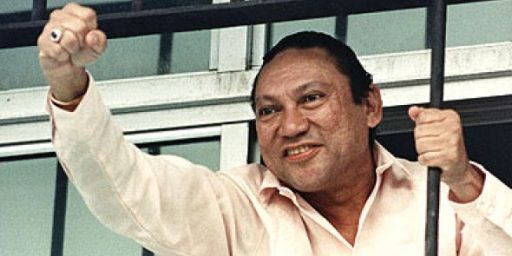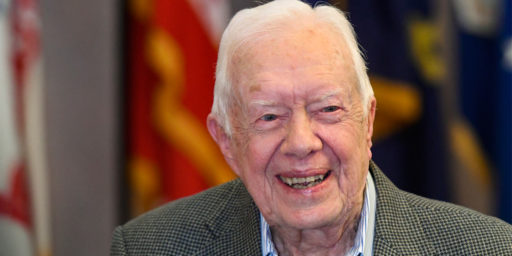Decline of the Neocons?
Paul Richter has proclaimed this A Tough Time for ‘Neocons,’ noting that the group is on its heels in the wake of setbacks in Iraq. As is usually the case with ideological movement, members say their policies are just fine but that their execution was flawed. As always, the counter-factual is impossible to test.
An odd throwaway line from an anonymous source is getting some attention, though:
“Bush could end up looking like the worst president since Jimmy Carter because of Iraq, and people are going to say, ‘You got us into this mess,’ ” said one Washington source who considered himself a neoconservative and spoke on the condition of anonymity.
While it wouldn’t surprise me if the neocons get blamed if Bush loses in November, it’s far from clear his would be a failed presidency. Of course, since Carter was only three presidents ago, being the worst since Carter wouldn’t be that difficult.
Michigan history prof Juan Cole finds the assertion absurd.
Jimmy Carter was a far better president than W. can ever hope to be. Carter made peace between Israel and Egypt. He resolved the Panama Canal issue to everyone’s satisfaction, and we’ve never heard any more about it because there haven’t been subsequent problems. He avoided a potentially disastrous US attempt to prevent or roll back the Islamic Revolution in Iran. He used the foreign aid carrot to begin the process of pushing the Latin American military regimes to democratize (a process that has been wildly successful). He raised human rights as a foreign policy issue. Carter is a quick study and a bright engineer. He was president at a time of post-Vietnam and post-Watergate doldrums, at a time when Iran and Afghanistan spun out of control, at a time of high petroleum prices, continued stagflation, and high inflation. I am not entirely sure what he could have done about any of these problems, most of which were beyond his control (and most of which remained beyond the control of his successors).
Certainly, presidents are blessed or cursed by their times. Clinton presided over a huge economic boom that was well underway before he took office. Bush 41 presided over an ill-timed recession that owed largely to something good–the collapse of the Soviet empire and the ensuing military drawdown. Certainly, Carter gets undeserved blame for the economic malaise that he presided over, since most of the 1970s were rather rough economically.
Still, I think Cole gives Carter too much credit for the good. The Camp David accords are the singular achievement of his presidency, but the aftermath of the 1973 Yom Kippur War and a host of other activities in Egypt, especially, made the situation ripe for resolution. The Panama Canal givaway was controversial at the time, although the Joint Chiefs backed it. Events in Panama certainly got worse before they got better, though, including a mini-civil war. While Carter gets credit for push for human rights–one could argue that he was the original neocon in that regard–he didn’t actually do much about it. The wave of democratization in that region during the late 1980s and early 1990s had many causes; I’m not sure Jimmy Carter was among the major ones.
Iran was the low point of his administration. Allowing terrorists to occupy sovereign American soil for 444 days was perhaps the weakest moment in modern US history, although it did have the direct consequence of bringing Ronald Reagan to the presidency. The result of not rolling back Khomeini’s regime at the outset was the world we’re now living in. That regime became the nexus of modern Islamist terrorism, training and funding many of the groups that are killing Americans today. Certainly, Reagan didn’t roll Khomeini’s regime back, either, but the hostage crisis would have given us just cause to take that action. The Middle East would be a much different place today had a stronger president been in charge in November 1979.
Rob Tagorda and Kevin Drum has thoughts on this as well.






Interesting that Cole leaves out one of Carter’s (few) genuine successes: Beginning the deregulation of the airlines, a policy that has indeed been wildly successful and saves travellers an estimated US$100 billion/year. I wonder why Cole didn’t think to include that one…?
—